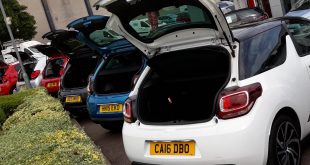New figures from RAC Breakdown show only a fifth of UK drivers regularly check their vehicles are ready for long journeys, while a quarter admit to never doing so – dramatically increasing the risk of breaking down and incurring costly garage bills.
The findings, released on the inaugural National Check Your Car Day, come within days of schools breaking up for summer, and the RAC believes many holidays could be ruined by breakdowns.
With pump prices at record highs, the cost of every summer trip by road will be dearer than ever, so it’s vital drivers don’t make matters worse for themselves with an avoidable breakdown.
The RAC expects to attend in the region of 350,000 breakdowns between today and the end of August, with most of these being for problems related to tyres and batteries.
While some of these can’t be avoided, many of them can be, so long as preventative breakdown tips are followed.
Here’s the RAC’s helpful new FORCES acronym to remind drivers about checks, which should always be carried out when your car is parked on level ground, switched off, and with a cold engine.
F is for FUEL: Ensure you have enough fuel for your journey. Cars use more fuel in heavy traffic and start/stop conditions typical of summer traffic jams. Don’t risk running out.
O is for OIL: To avoid overheating, engine damage and a potential breakdown, remember to check your oil level and top up when necessary.
R is for RUBBER: It sounds obvious, but your tyres are your car’s only connection with the road so it’s vital to look after them. Check them for signs of wear and damage and replace if necessary. If the tyres aren’t wearing evenly, then tyre pressures may be mismatched or there could be a fault with the steering. Then, check that all four tyres have at least 3mm of tread and are inflated to the correct pressures for whatever load your carrying (check your vehicle handbook for these) – this is vital to maintaining good grip, especially during summer downpours. Also take a look at your wiper blades to ensure they’re clearing the screen effectively and that the rubber has not perished.
C is for COOLANT: This does a vital job in ensuring the engine runs at the right temperature. If it’s not between the ‘min’ and ‘max’ levels, this could be the sign of a problem so contact a good garage without delay.
E is for ELECTRICS: If you have trouble starting your car, it might be time for a new battery so again, contact a garage or the RAC without delay. Your wipers will help keep your windscreen clear of bugs, and you’ll need your lights on during any heavy downpours. The electrics also control your indicators and windows, so check there are no problems.
S is for SCREENWASH: Top-up your windscreen washer fluid by using a good quality screenwash – this will keep your field of view clear of bugs.
“Our message to drivers is really clear – don’t let your well-earned break be ruined by a breakdown, and don’t make this year’s expensive summer even more costly by having to take your car to a garage,” said RAC Breakdown spokesman Rod Dennis.
Top tips from RAC patrols on avoiding a breakdown
- Manchester-based patrol Ben Aldous said: “Put simply, a well-maintained car is much less likely to break down than one that hasn’t been looked after. So, if you have a big drive coming up and suspect something on your car’s not quite right then get it into a good garage as soon as you can this week.”
- Kevin Andrews, who is works in the Bath area, advised: “Keep your locking wheel nut somewhere you can easily find it as this makes it quicker for us to do a tyre change if needed. Make sure that everything fixed to the outside of your car – bikes, roof boxes – are properly secured. If you’re travelling with a dog, again ensure it’s secure inside and has some food and water. And download and use the free MyRAC mobile app as it makes it much easier for us to find you.”
- Stuart Lurc, who is based in Salisbury, added: “Check your tyres every time, especially the inside front edges. You can fully lock the steering one way or the other so you can see the condition of your front tyres easily. And whatever you do, don’t start a journey with a known problem!”
 Automotive Blog Automotive Blog brings you the latest news, car reviews and information on the automotive industry.
Automotive Blog Automotive Blog brings you the latest news, car reviews and information on the automotive industry.




